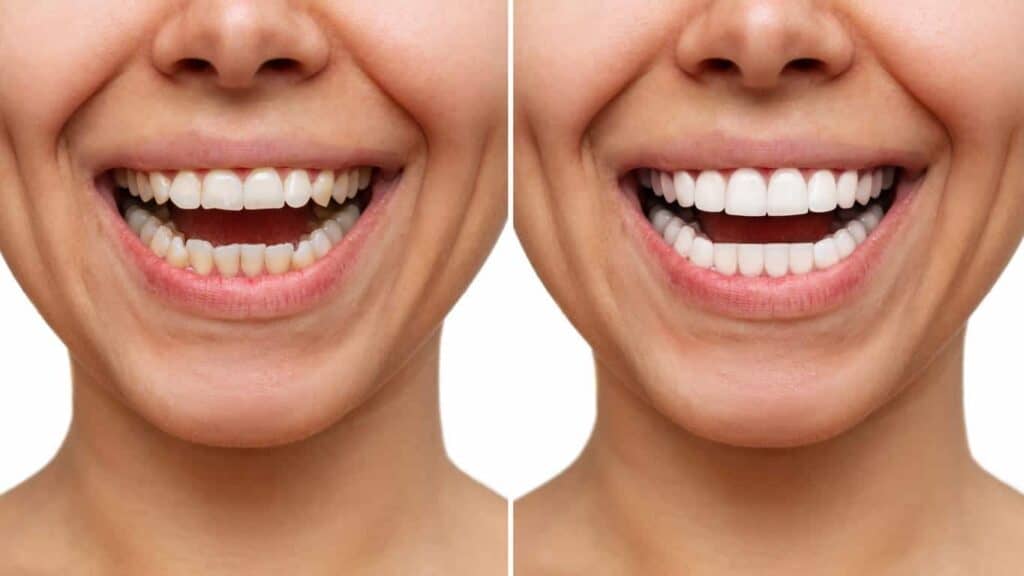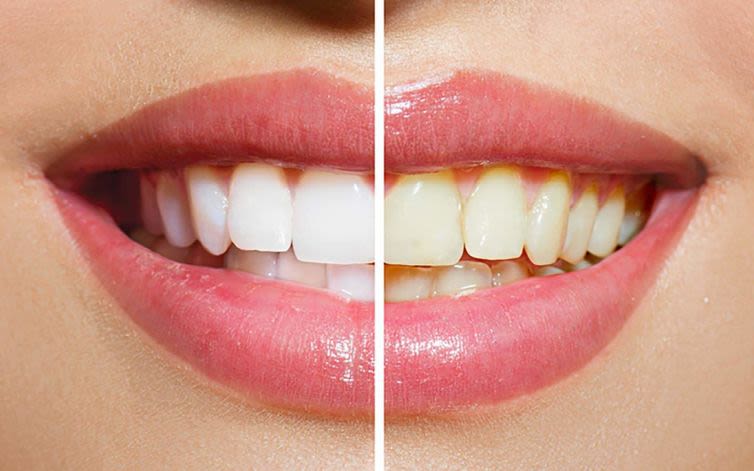Tips and home remedies for managing teeth sensitivity during and after teeth whitening, including the use of desensitizing toothpaste, limiting consumption of hot and cold foods, and seeking professional advice when necessary.
Introduction to Teeth Sensitivity during and after Teeth Whitening
Teeth whitening treatments, sought after for their promise of a dazzling smile, often come with the unintended consequence of teeth sensitivity. This discomfort can manifest during or after the procedure and is largely attributed to the bleaching agents these treatments employ.

These agents penetrate the tooth enamel to lift stains but can also irritate the nerve endings within the tooth, leading to sensitivity. The importance of addressing this sensitivity cannot be overstated—it not only ensures a more comfortable whitening experience but also safeguards your oral health by preventing potential damage to your teeth’s protective layers. 1 Hour Teeth Whitening
This article is designed as a comprehensive guide to navigate the complexities of teeth sensitivity associated with whitening treatments. We delve into the reasons why sensitivity occurs, including the role of enamel permeability and the impact of high-concentration peroxide treatments.
Moreover, we explore a variety of strategies to mitigate this sensitivity, from pre-treatment practices like using desensitising toothpaste to post-treatment care that includes limiting exposure to extreme temperatures. By integrating these tips and home remedies into your whitening regimen, you can achieve the brighter smile you desire while minimising discomfort and protecting your dental health.
Causes of Teeth Sensitivity During and After Whitening
Teeth sensitivity during and after whitening treatments is a common concern for many, stemming from various sources. The most prevalent cause is the exposure to the bleaching agents used in these treatments, particularly peroxide-based compounds. These agents have the potential to cause inflammation within the tooth pulp by permeating through the tooth’s protective layers, the enamel, and dentin, to reach the pulp. This process can result in a heightened sensitivity as the pulp contains the nerve endings. The structural composition of a tooth further exacerbates this sensitivity.
A tooth is made up of three primary layers: the outermost enamel, the underlying dentin, and the inner pulp. Of these, the dentin layer is especially prone to sensitivity due to its direct connection to the pulp where the nerves are located. This connection means that any irritation in the dentin can quickly translate to pain or sensitivity.
Moreover, the method of application and the concentration of the whitening agent can influence the degree of sensitivity experienced. For instance, higher concentrations of peroxide and prolonged exposure times can significantly increase the likelihood of sensitivity and discomfort. Gum irritation is another notable factor contributing to sensitivity.
This typically occurs when the whitening product inadvertently comes into contact with the gums, causing them to become irritated and sensitive. Such irritation not only causes discomfort but can also lead to receding gums over time if not addressed, further exposing the sensitive dentin layer to external stimuli. In this light, understanding the causes of sensitivity is pivotal in adopting preventative measures and mitigating discomfort during and after teeth whitening treatments.
Tips to Reduce Teeth Sensitivity Pre and Post-Whitening
Before Whitening
To minimise teeth sensitivity before undergoing a whitening treatment, using a desensitizing toothpaste or gel and taking pain medication can be beneficial. These products can help prepare the teeth by reducing sensitivity upfront. Furthermore, professional-grade whitening treatments often come with custom trays designed to minimise gum contact with the bleaching gel, thereby reducing the likelihood of gum irritation and subsequent sensitivity.
After Whitening
After the whitening treatment, it’s advisable to limit the consumption of extremely hot or cold foods and beverages to alleviate tooth sensitivity. Utilising fluoride products can also help strengthen the enamel, making the teeth less prone to sensitivity. Additionally, brushing with a soft-bristled toothbrush is recommended to avoid further aggravating any sensitivity that may have developed.

Home Remedies for Managing Teeth Sensitivity
In the quest to combat teeth sensitivity that often follows whitening treatments, home remedies stand out for their accessibility and effectiveness. Nonsteroidal anti-inflammatory drugs (NSAIDs), available over the counter, can provide swift relief from the discomfort that characterises teeth sensitivity.
These medications work by reducing inflammation in the tooth pulp, which is often agitated by the bleaching agents used during teeth whitening. However, it’s crucial to adhere to the recommended dosages to avoid any potential side effects.
Moreover, the strategic use of desensitizing toothpaste offers a longer-term solution to managing teeth sensitivity. Formulated with active ingredients such as potassium nitrate and sodium fluoride, these toothpastes help in blocking the pathways that transmit pain signals to the tooth’s nerve.
An illustrative example of this in action is the application of a small amount of desensitizing toothpaste directly onto the sensitive areas of the teeth using a fingertip, allowing it to sit for a few minutes before gently brushing it off. This method not only provides immediate relief but, when used regularly, can significantly diminish the intensity of teeth sensitivity experienced post-whitening.
Professional Advice and When to Consult a Dentist
Teeth whitening, while a popular cosmetic procedure, can occasionally lead to discomfort or heightened sensitivity, making professional advice invaluable. If you experience persistent sensitivity or discomfort that doesn’t subside within a few days following a whitening treatment, it’s crucial to consult your dentist.
A dental professional can assess if the sensitivity is a normal reaction to the whitening process or if it’s indicative of a more serious underlying issue, such as enamel damage or gum infection. Moreover, dentists are equipped to recommend and provide access to specialised desensitising products, such as toothpastes or gels containing potassium nitrate or sodium fluoride, which are not readily available over the counter.
These products are formulated to address sensitivity more effectively than standard options.
Furthermore, dentists can evaluate whether the concentration of peroxide, a common bleaching agent used in teeth whitening treatments, is appropriate for your teeth. In some cases, a high concentration of peroxide can exacerbate sensitivity, especially if there’s pre-existing dental health issues. This professional assessment is crucial as it helps in customising the treatment to minimise discomfort while achieving the desired whitening effect.
For instance, if you’re using a home whitening kit and experiencing severe sensitivity, a dentist might suggest switching to a product with a lower peroxide concentration or advise on alternative whitening methods that are gentler on your teeth. This tailored approach ensures not only the efficacy of the whitening treatment but also the health and comfort of your teeth.
Preventing Teeth Sensitivity During Whitening Treatments
Prevention is key when it comes to managing teeth sensitivity associated with whitening treatments. Adhering strictly to the instructions provided by the whitening product or your dental professional cannot be overstated. This includes not only the duration for which the whitening agent is applied but also the frequency of treatments.
Overuse or misuse of whitening products can lead to increased enamel permeability, exacerbating sensitivity. For instance, if a product suggests a treatment period of two weeks with intervals between applications, deviating from this schedule can heighten sensitivity risks.
Moreover, the choice of whitening agent plays a significant role in mitigating potential sensitivity. Whitening products vary in their hydrogen peroxide concentration, with higher concentrations often leading to greater sensitivity. Opting for products with lower concentrations of this active ingredient can significantly reduce the likelihood of developing uncomfortable sensitivity.
A practical approach could involve starting with a lower concentration to assess how your teeth react before considering stronger treatments. Additionally, incorporating products designed for sensitive teeth, such as toothpaste or gels containing potassium nitrate and sodium fluoride, into your oral care routine before beginning the whitening process can fortify your teeth against sensitivity. This preemptive step can create a more resilient dental environment, less susceptible to the irritative effects of whitening treatments. Come and see why Aspire White is the leading choice for 1 Hour Teeth Whitening. We can’t wait to give you the smile you deserve!
Conclusion on Teeth Sensitivity Management
Managing teeth sensitivity effectively is paramount for those undergoing teeth whitening treatments. Understanding the root causes of this sensitivity, such as the exposure to peroxide-based whitening agents that can inflame the tooth pulp and irritate the gums, allows for a more targeted approach to alleviating discomfort.
Implementing preventative measures before treatment, such as using desensitising toothpaste and adhering to professional advice regarding the use of custom trays, can significantly minimise the risk of sensitivity. Furthermore, adopting post-whitening care practices, including limiting extreme temperature foods and utilising fluoride products, plays a crucial role in fortifying the enamel and reducing the instances of sensitivity.
Moreover, the incorporation of home remedies and professional products specifically designed to tackle sensitivity, such as NSAIDs for pain relief and desensitising toothpaste containing potassium nitrate and sodium fluoride, can offer immediate and effective relief.
It’s vital, however, to remain vigilant and consult a dentist if sensitivity persists or worsens, as this could indicate a more serious underlying issue. Ultimately, by combining a thorough understanding of teeth sensitivity with a proactive approach to treatment and aftercare, individuals can enjoy the benefits of a brighter smile without compromising their comfort or oral health.



